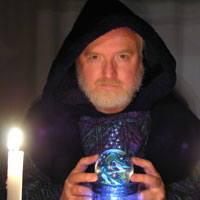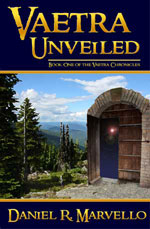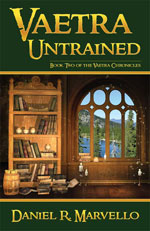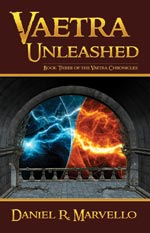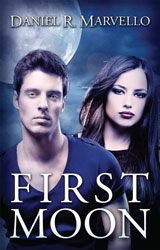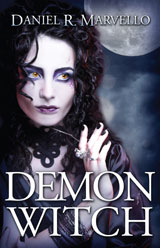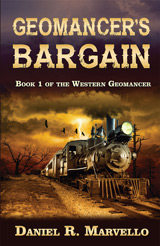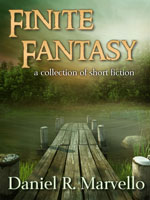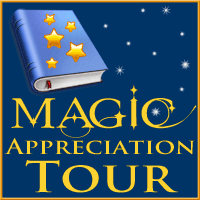When fellow Magic Appreciation Tour author Will Hahn announced his blog tour for Judgement’s Tale Part One: Games of Chance, I was quick to volunteer. Will has shown great support for other fantasy authors by hosting their guest posts, so I hope that good karma comes back to help him now on his own tour.
When Will asked me what kind of guest post I wanted, regular readers of this blog will know exactly what I requested: “Tell me about your magic system!” I hope you enjoy Will’s unique and brilliant sense of humor as much as I do as he shares the magic system for his story word, the Lands of Hope. When you are done reading, be sure to enter Will’s giveaway at the bottom of this post.
Welcome to the Vaetra Files, Will!
Magic and Miracles in the Lands of Hope
by Will Hahn
I must beg your forgiveness at the start—I personally am neither a mage, nor preacher, nor was I much of a scientist in high school (I flunked that dumb oleic acid lab three times). There are aspects of How This Works that I cannot fully understand from watching the Lands and its peoples. On the other hand, I’m a pretty good chronicler if I do say so, and I have been watching closely for a long time. Here’s what I know for sure:
Magic
This is the lore taught by the Hopelord Araluntir and wielded by many of the original generation of heroes from ancient times. It does not appear that the use of magic is limited to a line of inheritance or a rare character trait—what we might call genetics. Some who cast magic are quite ordinary-seeming folk, and in any generation there are a goodly number who can cast spells—probably upwards of five percent of the population (and among the despised adventuring class, an inordinate proportion, sometimes the majority). However, magic is limited in the Lands by several factors:
- Spells are hard to learn, requiring intelligence and complex memorization skills. The ability to cast any but the simplest spells is evidence of above-average intelligence. Most accomplished wizards in the Lands would qualify as geniuses in our world. Very confused geniuses, most likely.
- Casting magic is exhausting, each successful spell taking energy directly from the mage; even a series of failed attempts can exhaust the caster. Mages who over-do it (as adventuring wizards seem addicted to trying) often pass out, and if they are not among friends, all is likely lost for them.
- Spellcasting nearly always requires a series of gestures and a call in the sing-song cant known as Sorceror’s Tongue. The words do not convey images or thoughts but are more closely aligned to emotions or desires. As a mage advances in lore and expertise, she may find it possible to cast lesser spells without speaking, or without gestures. The very great mages can sometimes cast without either, but again this is difficult and rare.
- Higher level spells, including those that have massive effects, are indeed carefully guarded by the Mages of the Crystal City near the center of the Lands’ western coast. Admissions to the wizard’s enclave are rarer than a dragon’s kindness, and no one ever leaves the capital of Hopeful magic (to common knowledge).
- The people of the Lands, for the most part, are very traditional customary societies. Children almost always go into the same crafts or positions as their parents; few travel or desire to learn new things. Adventurers, by running roughshod over such ways, earn their poor overall reputation, and supply the majority of new wizards in any generation (cut back again by the risks they take).
The ancient heroes clearly did incredible things using magic: the three capital cities of Hope were created overnight using the hulls of their fleet to form the impregnable walls. Hope also devised wondrous artefacts in the elder days, capable of bringing powerful sorcerous might to bear, without draining the wielder. Clearly the personal energy provided by the mage is more of a spark than the fuel on which the spell works—that energy forms in response to the motions, calls and other elements of casting.
On a lesser scale, magical items which channel the ability for the wearer to cast a given spell are not terribly difficult to make—the process requires time and the continual support of a caster’s energy. Most folks see little call for these items in such peace as the Lands enjoy. Again, it’s only those rascals who insist on poking into the far forgotten corners that come to the towns and cities in search of magic items. They are invariably quoted outrageously expensive prices; on some occasions they astonish all and sundry by paying in full at once, with gems and coin. Perhaps understandably, adventurers have no success in establishing credit.
Rustics
No sage questions that at one time the indigenous inhabitants of these Lands also could make use of unique magical effects, though they appear to be sourced quite differently than the magic of Hope. Rustic magic was based on the elements of the world—earth, air, water and fire—sometimes found in mundane objects like small painted stones or water-bowls but endowed with the ability to do a remarkable thing, either once or a limited set of times before the magic “returned” to its natural home outside the device.
Permanent magic among the rustics was rare, but interesting—most of it was based on the use of perfectly pure substances, most commonly gemstones. If a large and pristine gem could be found and “honored”, usually by a skillful setting in an appropriate and considered fashion, it might manifest amazing abilities for its wielder. The lore of these stones has been largely lost, and the reliability of such world-magic is open to question.
These rare, powerful gems can be given as gifts, or even stolen without danger according to the lore. But a gem that has been “insulted” through common sale loses whatever magic endowed it, and becomes as mundane as the money used in the purchase, “returning” whatever magical energy it contained to the world. In the elder days of Hope following the departure of the heroes, colonists and settlers ignorant of the consequences bartered for and plundered many such stones, which of course ceased to show any unusual abilities.
This led many to argue that the magic of rustic gems was a myth, but enough examples of artefacts have been preserved to indicate the truth behind this largely-lost lore. Stories of some survive until this day; and it may be that Hopeful mages, exchanging knowledge with rustic shamen, developed the ability to create single uses of their magic spells on paper scrolls, a not uncommon feature of wizardry in the Lands at present.
Miracles
Quite aside from the study of spellcasting among the wizards, devout preachers and pious warriors have shown the undoubted ability over the years to summon holy magic to their aid, triggered by sincere faith in and devotion to one of the heroes of old. Since it depends for its efficacy on the power of belief, miraculous spells are innately personal and there are few hard and fast rules about the casting process. Like magic, miracles are exhausting to the caster; there is often a call but these are more direct, in the nature of a request and worded in the Ancient tongue (thus very difficult to modify). The caster in a dark place could call, for example, for light by using the words in Ancient, “Conar, I wish for light like Aral” (the lower moon of the Lands). The miracles produced are always aligned with the life and interests of the hero called upon, and depend completely on the sincere belief of the caster in that hero.
The legends of centuries past contain a few tales of great warriors or mages who were even able to summon one of the heroes to their aid through prayer. These tales cannot be confirmed in the current age, the wild claims of some adventurers notwithstanding.
One of the most learned sages in the history of the Lands, Faltus Fanem, devoted his career to thaumaturgy, the study of magical forces. His great opus on the subject was composed near the end of his life, a time when by his own admission events were slowly driving him mad. But towards the beginning of his book (quoted in Judgement’s Tale Part Two, Strength of Conviction) he seems lucid enough, and Faltus’ explanation of magical energy suggests that at their heart all three forms of magic are in fact the same, but accessed by differing methods.
Excerpt from The Nameless Tome of Faltus Fanem
I have written extensively on the nature of magic itself in other titles, but for those unversed it is sufficient to note the following.
FIRST: Magic is literally everywhere: not bound within the mage, nor drawn from other realms, but tapped out of the air, water, earth and flame. There is enough magical energy in the pages of this book to set the room you sit in on fire.
SECOND: Your body, in itself and so long as you live, is the most powerful magical instrument you will ever come in contact with, barring only the body of someone else. Life energy, about which I know too little, is to magical energy as flame is to oil. Or it is like the influence of a magnet upon iron.
THIRD: The sum and total of casting magical spells consists in only this: the caster learns how to align his body to the energy of the world, which naturally faces aside from him but can be turned. The body of lore learned by wizards is a series of words, gestures, mental concentration images, and (for larger and more permanent magics) the use of materials and items in concert which accomplish this end.
By what means do water and earth, wood and stone turn from good to evil? No change in physical substance, but instead of the alignment of each smallest portion of its tangible matter, is responsible. In the state of nature, this condition is known as neutrasm. When aligned towards the hopeful mage (or when the caster brings himself into proper alignment, which is the more nearly accurate description) then this same object should be seen as achieving a state of pronasm. From this alignment, magic can be cast, causing flame to appear in the midst of rain, light to dispel the darkness, and all manner of super-neutrasmic effects. The mage’s life-energy, as stated, catalyzes this process and limits its effect- for by conjuring too greatly or rapidly the caster becomes exhausted and risks losing consciousness or even life. But when the mage has become dominated by fear and hatred, he seeks to turn this alignment in its opposite direction, away from pronasm and beyond neutrasm to its nether pole. Then matter aligns to the caster in a relationship of miasm. Sorcerous plagues, blackfire, abominable creations, contact with the planes of hell, and other catastrophic effects are the result.
When a mage reaches the end of his earthly span, this well-practiced habit of alignment has potential to spread. The vessel of energy contained by a human life, as formerly asserted, is the spark for tremendous magical affect. The condition or alignment in which the mage passes from the earth, then, has a much-increased consequence for the balance of miasm and pronasm in the land.
I hope you’ve enjoyed this peek into the Lands of Hope and one of its authors; in the upcoming release of Judgement’s Tale Part One, Games of Chance, you will see spells and miracles being cast and the process discussed among some of the main characters. Look for Linya the mage, keep an eye on the smiling Healers Guildmistress Natasha, and watch how Solemn Judgement himself casts a miracle of Hope on his first day in Conar.
About Judgement’s Tale Part One: Games of Chance
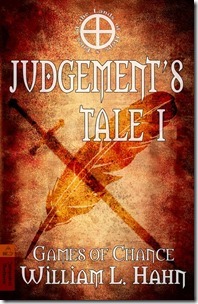 For twenty centuries the Lands of Hope prospered from their Heroes’ peace, but suffer now from their absence as a curse thickens over the central kingdom known as the Percentalion. An immortal omniscient conspirator schemes to escape the extra-worldly prison holding back his tide of undeath, using a demonic ally in a plot to bring back hell on earth. Solemn Judgement steps onto these Lands both a stranger and an orphan, driven to complete the lore his father died to give him.
For twenty centuries the Lands of Hope prospered from their Heroes’ peace, but suffer now from their absence as a curse thickens over the central kingdom known as the Percentalion. An immortal omniscient conspirator schemes to escape the extra-worldly prison holding back his tide of undeath, using a demonic ally in a plot to bring back hell on earth. Solemn Judgement steps onto these Lands both a stranger and an orphan, driven to complete the lore his father died to give him.
In a world beset with increasing chaos, the bravest Children of Hope must take mortal chances. A young woodsman’s spear-cast, a desperate bid to save his comrades; the Healers Guildmistress’ cheery smile, hiding a grim secret and a heavy burden of guilt; the prince of Shilar’s speech in a foreign tongue, a gambit to avoid bloodshed or even war. As a new generation of heroes, scattered across the kingdoms, risks their lives and more, Solemn Judgement- soon to be known as The Man in Grey- must learn to play… Games of Chance: Part One of Judgement’s Tale
About Wm. L. Hahn
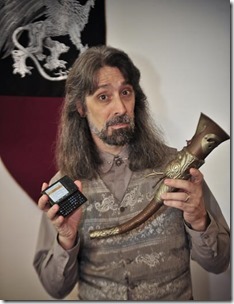 Will Hahn has been in love with heroic tales since age four, when his father read him the Lays of Ancient Rome and the Tales of King Arthur. He taught Ancient-Medieval History for years, but the line between this world and others has always been thin; the far reaches of fantasy, like the distant past, still bring him face to face with people like us, who have choices to make.
Will Hahn has been in love with heroic tales since age four, when his father read him the Lays of Ancient Rome and the Tales of King Arthur. He taught Ancient-Medieval History for years, but the line between this world and others has always been thin; the far reaches of fantasy, like the distant past, still bring him face to face with people like us, who have choices to make.
Will didn’t always make the right choices when he was young. Any stick or vaguely-sticklike object became a sword in his hands, to the great dismay of his five sisters. Everyone survived, in part by virtue of a rule forbidding him from handling umbrellas, ski poles, curtain rods and more.
Will has written about the Lands of Hope since his college days (which by now are also part of ancient history). With the publication of Judgement’s Tale Part One, Games of Chance, he begins at last to tell the tale of the Land’s most unique hero, The Man in Grey.
Contact Links
Will Hahn is the chronicler of the Lands of Hope tales.
The Plane of Dreams – See the trailer!
The Ring and the Flag – Try the Audio Book at Scribl!
Fencing Reputation
The Book of Tales
Will Hahn at Smashwords
Will’s Amazon Page
Will’s B&N Page
Will’s Blog Thoughts – Including tales of a happy childhood (which continues), hopes for a writer’s journey, and analysis of Classics You’ve Never Read
Rafflecopter of the Lands Contest
Enter to win free Tales of Hope here!
